What is intermittent fasting? How to do intermittent fasting? What are the benefits of intermittent fasting? What are the common mistakes in intermittent fasting that make you gain weight?
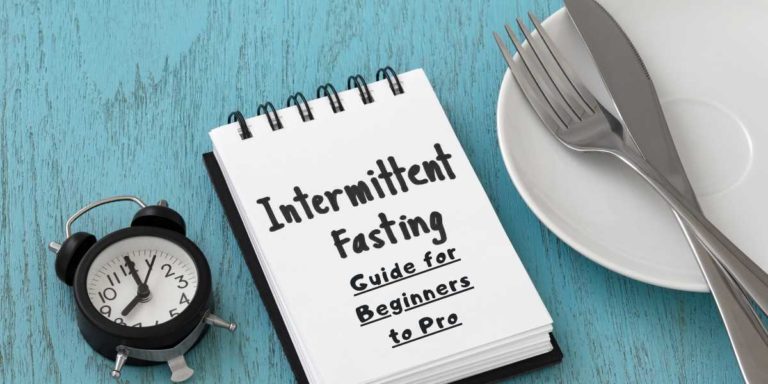
If you were searching for any of the above questions, then your search ends here.
Unless you live in a cave, you have probably heard of low carb and keto and intermittent fasting.
But what is intermittent fasting all about?
Today we are going to take a little bit closer look and really explain in detail
What is intermittent fasting?
A lot of people are scared of fasting; they think it is the same thing as starving,
They have been told you have to eat so and so many meals a day and if you don’t, you are going to crash and burn, you can’t focus, you are going to get sick and lots and lots of other nonsense.
So fasting is simply when you don’t eat,
So you either eat or you don’t eat. When you are eating, you are not fasting and when you are not eating, you are fasting.
It is as simple as that.
When you are eating, you are triggering insulin, and insulin is a storage hormone.
So every time you eat, you are telling your body to store something and if you eat a lot of carbs, you are telling your body to store carbs that get converted into fat.
So insulin is telling your body to store.
It is essentially a carbohydrate and fat-storing hormone.
It doesn’t store fat directly, but it does stores fat indirectly, because when it stores carbohydrate and when the carbohydrates stores or the glycogen store fills up,
The rest gets turned into fat, and insulin keeps us from retrieving that fat.
So the more insulin that the food triggers and the more often that we eat, the more we are telling our body to store.
And the more that we don’t eat, the less we are telling it to store, and the more we are giving it an opportunity to retrieve some of that fat and some of the carbohydrates.
So essentially, eating promotes insulin resistance, and not eating promotes insulin sensitivity. or the opposite of insulin resistance.
Now, the question is,
Why is this big deal?
Well, the biggest reason is that; all of these ideas: the low carb the keto, intermittent fasting has taken off so explosively, that people want to lose weight.
And insulin resistance is the primary factor responsible for obesity and that’s the one thing that people really care about.
There are so many people that are overweight, the majority of the population are significantly overweight and they are finding a way to turn it around.
But what they are really doing is, they are turning around their insulin resistance and insulin resistance is not just about weight, it is also a contributing factor,
You can make a strong argument for insulin resistance, where insulin being the dominant contributing factor in obesity, diabetes, cardiovascular disease, stroke, dementia, and autoimmunity.
At least 95% of the stuff that kills people is related to insulin resistance.
So intermittent fasting is one of the most powerful ways to reverse insulin resistance.
Foods that are high in glycaemic index triggers insulin, and foods that are low in glycaemic index triggers less insulin.
So that’s why keto is so popular, it doesn’t trigger so much insulin.
But an even stronger way of not triggering insulin is to not eat,
So if you combine the two, you don’t necessarily have to go keto but you want to go low carb because then, you bring in your body into a better balance that prepares it for intermittent fasting.
So you need to combine low carb with intermittent fasting,
Now you’re attacking this insulin resistance from two directions.
Between each meal, you are fasting.
So if you eat breakfast at 9 and lunch at 12 and snack at 3 and dinner at 6 and late-night snack at 9, you have a 3 hour fast throughout the day.
And then if you have your first meal at 9 and your last meal at 9, then presumably, you don’t eat during the night, you have a 12 hour fast during the night.
So, every one of us is already doing intermittent fasting while we are sleeping.
And most of us are probably getting somewhere around 12 hours of intermittent fasting every night.
A lot of people call this a trend or a fad or all these new-fangled ideas, but nothing is older than the idea of eating low carb and doing intermittent fasting,
Try to relate intermittent fasting with diet of our ancestors

Because our ancestors did not wake up to a breakfast buffet,
There wasn’t any oatmeal and pancakes for them to have in the cave,
They woke up and maybe they had something leftover from the night before and probably not.
They went out and they found something or hunted or retrieved something or produced the food before they could eat.
Our ancestors probably ate one or two times a day and in between, they might have snacked or found some berries or some nuts or something like that.
But they probably did not have more than two substantial meals a day.
So this is what we are designed for, this is what our physiology and DNA best adapted to,
And then, if they couldn’t find food for a couple of days, then they were doing a fast for a couple of days.
Humans have lots of defense mechanisms; we have lots of backup systems to produce energy and keep us functioning for days and weeks without food.
What we don’t have any defense against is for eating all the time, eating every 2-3 hours, because that produces insulin resistance.
We have never seen that kind of eating pattern in our history.
When you start doing intermittent fasting, if you look online, there are all these different terms that make it look very complicated.
But trust me, it isn’t.
As I said, if you are eating your breakfast at 9, and your last meal at 9, now you have intermittent fasting of about 12 hours,
Intermittent fasting plans
You can do intermittent fasting by following one or the combination of one or two plans discussed below as per your body needs and results you get.
Intermittent Fasting 16 8
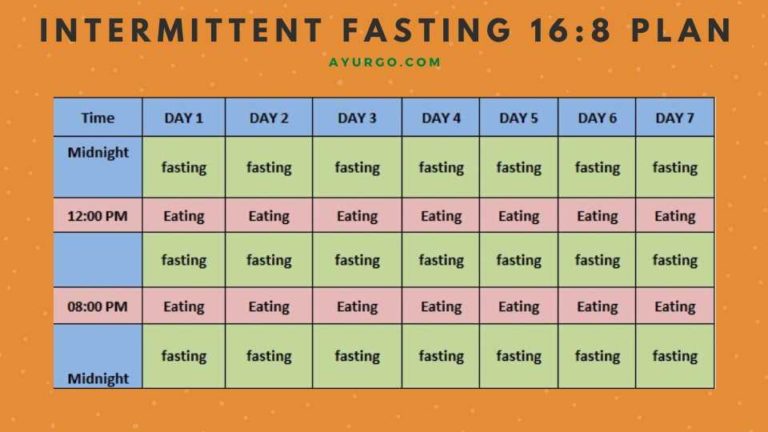
Let’s say that you skipped breakfast, and you have your first meal at noon, and then you may eat lunch or you may not, and have your last meal at 8,
Now, you just expanded your fasting window into a 16:8.
You took it from 12 hours of fasting to 16 hours,
This is one of the most popular ways of doing intermittent fasting.
Personally, I don’t even call it Intermittent fasting, I call it skipping breakfast.
And what people find once they start eating a low carb diet is that they are getting into the body’s natural pattern.
When you don’t feed it carbohydrates all the time, it doesn’t want food all the time,
And simply extending the fasting window to 16 hours can have a remarkable effect,
Because you are giving your body 16 hours without insulin spikes, which can be tremendous in reversing the insulin resistance,
Now, that’s not going to be enough for a lot of people with severe stubborn long term insulin resistance.
Probably it’s going to be better than eating all the time, but it may not be enough to reverse their situation.
So, now you need to start playing around with it,
Intermittent fasting 18 6
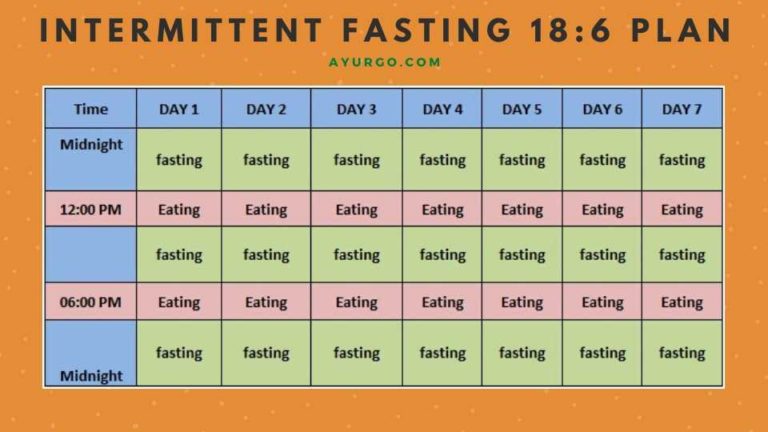
Now, if you do an intermittent fasting 18:6,
In that, you have your breakfast meal at noon, and then you have your last meal a little earlier like at 6 o’clock, and then don’t have any snacks.
Now, you have a full 18 hours of intermittent fasting window, you get another 2 hours window to reverse insulin resistance.
And then you can push it a little further,
Intermittent fasting 20 4
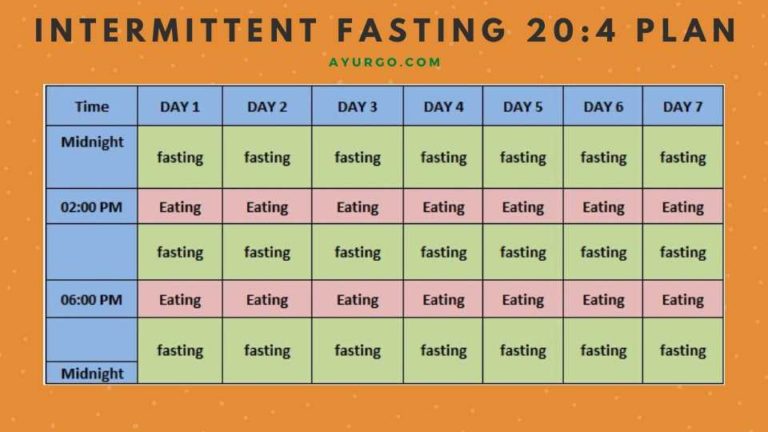
In intermittent fasting 20:4, you just need to eat your lunch at 2 PM, and your last meal at 6 PM,
Like this, you have a 4 hours feeding window and a 20 hours fasting window,
Some people take it a little bit further, and it is called
One Meal A Day (OMAD) Intermittent fasting
OMAD intermittent fasting is another very popular trend,
If you are overweight, if you are insulin resistant, then this is a really good idea.
But just play with it, see how it feels, see how it works,
And here is where you put all your food in a single meal of the day and then you don’t eat the rest of the day.
By the time you have tried some of the above ones (16:8, 18:6, and 20:4), it is not as hard as it seems.
During these fasting, some people are very strict, and they say that during the fasting, you can only have water, or maybe black coffee.
But if you are not extremely insulin resistant, then you can have these drinks.
So now, when you sip these drinks, you don’t feel very hungry, neither you are spiking any insulin.
Intermittent fasting 5 2
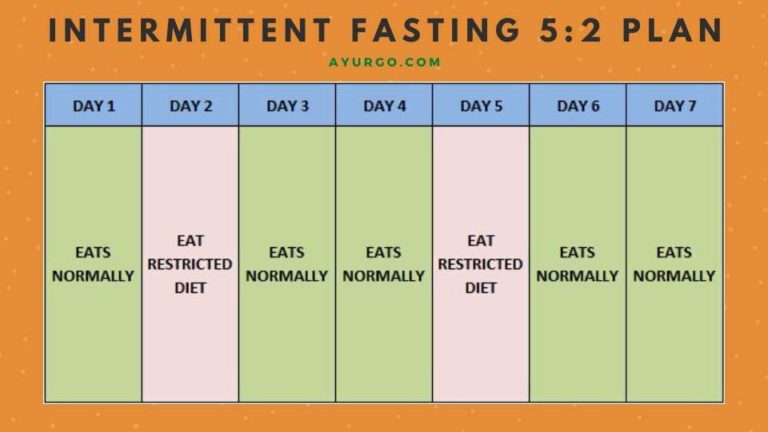
Some people also promote something called intermittent fasting 5:2,
You need to understand that there isn’t any pattern that is best for you, you just need to try different things and see what kind of results you get.
So intermittent fasting 5:2 would be that, you eat what you consider normal on 5 days a week, whether it is 3 meals a day, or eat twice a day,
And then for 2 days, you eat more restricted.
So, if you want to start out with intermittent fasting 5:2, then you eat the way you normally eat, say 3 meals a day, and the remaining 2 days, you follow one of the discussed patterns.
Or, if you are already doing intermittent fasting 16:8, then you could do 16:8, 5 days a week, and OMAD on the remaining 2 days.
The more you get into this, the more you realize that it’s not a big deal.
You don’t have to eat all the time,
The people that have told you that, you have to eat 3 meals a day, and breakfast is the most important meal of the day, and they scare you and say,
If you don’t eat, if you don’t get your blood sugar drops, then you lose your focus, and your grades will be terrible, and all this nonsense.
We have been conditioned into thinking that we have to eat all the time, and we have been even told that we have to eat 5-6 meals a day with snacks more frequently.
All of this is nonsense, the more frequently you eat; the more you program your body to insulin resistance and setting yourself up later in life for different diseases.
Now, let’s look at some of the
Intermittent fasting benefits
Here, I will be telling 20 benefits of why intermittent fasting may be good for you. Fasting allows some physiological changes, and we’re going to talk about the benefits of those changes.
1. Intermittent fasting helps reducing blood glucose

The first benefit is that when you don’t eat, you reduce blood glucose.
Anytime you eat something, it has to be digested and at some point enters the bloodstream and raises blood sugar.
So if you’re having high blood sugar then fasting allows that blood sugar to drop.
2. Intermittent fasting helps Reducing Insulin
When the blood sugar drops, there is less or no need for insulin to be released, so along with drop blood sugar goes less insulin.
3. Intermittent fasting helps Reversing Insulin Resistance
And if you have high insulin a lot, if you eat a lot of sugar over a long period of time, and you trigger a lot of insulin over a long period of time, you get insulin resistance.
So fasting helps reverse insulin resistance, and as a result of reversing insulin resistance we also reverse some of the things that are directly associated with insulin resistance.
4. Intermittent fasting helps in Weight Loss
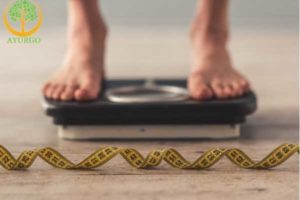
Intermittent fasting allows you to lose weight and that’s sort of self-explanatory.
If you don’t eat, you lose weight.
But more importantly, it allows you to lose weight and keep it off,
99% of diets fail because they don’t address insulin resistance.
If you restrict calories and you manage to lose some weight, but you’re still insulin resistant, the weight will come back, because you haven’t changed your set point.
So what fasting allows you to do is to lose the weight and reduce insulin resistance and then your basic metabolic rate stays up.
5. Intermittent fasting helps in Fat Loss

It allows you not just to lose weight but also to lose fat and to lose the fat in the place where it matters the most.
Because, the fat that’s gained around the midsection, that’s the dangerous one, that’s the one associated with insulin resistance.
It’s called abdominal fat and it is associated with all the problems associated with insulin resistance.
So by fasting, you drop insulin and you allow yourself to lose the bad fat.
6. Intermittent fasting helps in Reversing Syndrome X
It helps reverse syndrome X metabolic syndrome, and in doing that, metabolic syndrome is associated with insulin resistance and things like cholesterol.
So intermittent fasting can help lower
- Cholesterol
- Triglycerides
- Blood pressure
- Inflammation
- Risk of cardiovascular disease
- Heart attacks
- Myocardial infarctions
- Stroke
So I think so far we’ve covered a good amount of reasons, because these are all the top killers of mankind especially in the Western world, but pretty much in the entire world these days.
7. Intermittent fasting helps in Type 2 diabetes
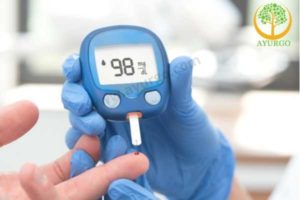
The end-stage or the severe stage of insulin resistance is type 2 diabetes.
So, fasting is one of the most powerful ways to reduce type 2 diabetes,
And in doing that, we also reduce the risk of getting blind because type 2 diabetes is the number one cause of blindness.
- It is the number one cause of kidney failure,
- It is the number one cause of amputations.
So, people who are on dialysis for kidney failure, that’s usually a result of type 2 diabetes.
People who start getting their toes, and their feet, and their legs, and their fingers amputated, that’s a side effect primarily of type 2 diabetes.
So we’re reducing the risk of all of those problems.
8. Intermittent fasting helps in Autophagy
Intermittent fasting induces self-eating or autophagy, and what that means is, the body gets really good at recycling all the stuff that you don’t want in your body.
Their body gets much better at recycling, it starts eating the stuff that you don’t want in the body.
When you eat all the time the body doesn’t have to be so specific, it doesn’t have to be so meticulous in paying attention to every little scrap and morsel that you eat.
But when you don’t eat, the body has to get much better at preserving the resources.
So now, it gets much better at recycling the debris,
So cells that break down and die, it gets really good at using all those materials and it goes much better at going after those cells that need cleaning up such as cancer cells.
9. Intermittent fasting helps in reducing the chances of Cancer
Reduced cancer is a result of that autophagy and some of the things that also help clean up our pathogens; another benefit is improved immune function.
10. Intermittent fasting induces longevity
Autophagy is associated with longevity, just like they’ve done studies on calorie restriction and found that animals and people live longer.
Autophagy is a very powerful way to create the same effect, it extends lifespan.
Autophagy and fasting also produce two hormones called human growth hormone and BDNF brain-derived neurotrophic factor.
Both of these are also associated with longevity,
But the really cool part about these two hormones is that they are necessary to make synapses, and what does that mean?
Our brain has a hundred billion brain cells, and each one of those brain cells makes an average of five to ten thousand connections or synapses with other cells.
So those complicated connections are called neural networks, and it is how your body sends signals, it’s how your body learns things, it’s how your body remembers things.
The more BDNF and the more growth hormone that you have, the easier it is for the body to make synapses and new connections.
So in other words, you get better at learning,
And they found that fasting and high-intensity interval training and things that improve growth hormone and brain-derived neurotrophic factor can even build new brain cells.
Even 15-20 years ago they didn’t think that was possible, but now they know that you can make new brain cells, but it depends on these two hormones.
11. Intermittent fasting Improves your Leptin Sensitivity
Leptin has to do with fat storage and fat utilization, so your body gets more sensitive and better able to tell when is the time to eat, what resources we have in the body.
12. Intermittent fasting Improves your ability to use Ghrelin
Ghrelin also is related to hunger, so both of this help you regulate hunger and your body knows better when you are actually hungry, and when you just have a craving.
So one of the aspects of long-term weight loss is to teach the body what appropriate energy levels and appropriate hunger is.
13. Intermittent fasting Improves Ketones
Intermittent fasting just like a Ketogenic diet improves ketones,
In the keto diet, we talk about reducing carbohydrates so low that the body has to burn fat, and a side effect of that is ketone production.
Well, when you fast, you’re eating zero carbs that’s even less than the Ketogenic diet,
So the production of ketones is even more powerful.
Part of that means that there are some brain benefits and when the brain gets happier, when the brain starts running more on ketones than glucose,
They have noticed benefits such as improved energy, improved mental clarity, improved concentration, and part brain benefit and part reduction in insulin and inflammation.
14. Intermittent fasting reduces the risk of neurodegenerative diseases
Intermittent fasting reduces the risk of Alzheimer’s disease, dementia, and associated neurodegenerative diseases.
Now we’re getting into something, a lot of people don’t talk much about, because so much is on the focus of blood sugar and so forth.
15. Intermittent fasting improves Gut Healing
Every time that you put something in your mouth and swallow that means your digestive system has to go to work,
And if you do that six times a day, then that’s six times a day your digestive tract has to go to work, that doesn’t give it much chance to recover and heal and regenerate.
So intermittent fasting is a powerful way to allow some gut healing.
The gut, the intestines, the membranes, the intestinal mucosa, all those sensitive tissues, that have a really high turnover, finally, they get a break and they have a chance to just regenerate and take care of themselves.
As a result, you can reduce leaky gut, which means you can reduce allergies and food sensitivities, you can reduce autoimmunity,
Because a lot of immune reactions are due to a leaky gut.
16. Intermittent fasting helps in Pancreas Regeneration
There’s some exciting research that shows that the pancreas can regenerate as well
So part of that is because, we’re giving the digestive tract a break and the pancreas is a digestive organ, it makes both insulin and digestive enzymes to break down the food.
So because we’re not eating it gets a break from both of those activities.
There’s some exciting new research that shows that there’s some hope to regenerate pancreas tissue both in type 2 and type 1 diabetic.
17. Intermittent fasting is simple and a time saver
Now, we’re getting into a few more practical benefits,
Intermittent fasting is simple, it saves time,
If you eat six times a day, that takes a lot of time, both food preparation and the time to chew and swallow.
But when you’re fasting, now all that time is freed up,
Whether you eat once a day or twice a day or if you’re doing an extended fast, it means you’re eating a whole lot fewer meals, you spend less time preparing, less time eating so it’s very convenient.
18. Intermittent fasting helps in getting rid of sugar cravings
Intermittent fasting can finally get rid of that sugar craving.
Sugar is an addiction; it controls many people’s lives, and something as simple as fasting can take care of that once and for all.
Another aspect of sugar cravings is, fasting gives you more flexibility.
So imagine that you can go out shopping, you can go out and do errands, you can go out in the yard and do some work without having to worry about planning in your meals.
If you miss a meal, if you have to go six or eight hours without eating, it’s not a big deal.
Your body knows what to do, you stay level-headed and you still function and feel good.
19. Intermittent fasting can save you money

If you don’t need to lose weight, then it’s probably not going to save you that much money, because you eat a little bit less during one period, you’re probably going to eat a little more during another period.
But if you are trying to lose weight then think about the weight that you have on your body that you want to lose,
Whether it’s 50 or 100 or 150 or 200 pounds, that represents probably thousands of dollars of food,
If you fast and you start using that stored bank account sitting on your body then you could save thousands of dollars in the process of getting rid of the weight.
20. Intermittent fasting can be very powerful
It can be that last resort for the person who has tried everything else and that just not getting the results.
Whether what they’re trying to improve is brain fog or whether it’s mental clarity or whether it is an autoimmune disease or whether it’s an ache or a pain.
A lot of times they’re stuck because their body has not been able to go through all these benefits of autophagy and insulin resistance reduction and so forth.
A lot of people, as many people as having had success on the low carb high fat or keto diet,
Some people do that and it still doesn’t work, they still don’t lose weight, they still don’t get any health benefits because their bodies are so insulin resistant that cutting the carbs is not enough.
You have to cut the carbs by taking them to zero and fast for an extended period of time, and for some people, a 16-8 is not long enough for the body to open up the fat vault.
They might have to go to OMAD or even 36 or longer fast than that.
So it can be very powerful.
It can be the thing that finally crosses the threshold that finally unlocks the body into moving toward a healing solution.
And remember, that fasting can be very powerful, but it can also be a little bit dangerous for the wrong person at the wrong time.
So before you get into any extended fasting, make sure that you learn enough that you can do it safely.
Do it under the supervision of a doctor who knows what they’re talking about.
If you’re going to do an extended fast and especially if you are on some kind of medication like type 1 diabetic.
Because if you start fasting then you are over medicating your insulin, or if you’re on metformin or something else and you start fasting,
Then you are over medicating because you’re not putting any more sugar into the system,
So now, there’s a chance of hypoglycemia and some stuff like that.
But intermittent fasting 16:8 should be perfectly safe for everybody, so start playing around with it watch lots of videos, read up on this, and get really smart talk to your doctor.
And then you can do this safely and reap some of these intermittent fasting benefits.
Now, let’s talk about
Intermittent fasting mistakes that make you gain weight
Most people are usually very successful at losing weight on intermittent fasting,
But there are some that don’t do so well,
They might actually plateau or even gain weight.
So, we’re going to talk about 12 intermittent fasting mistakes that you want to avoid so that you can reach your goal of weight loss.
When we do intermittent fasting, there are five things that we want to have happened,
We’re going to relate the successes and mistakes to those.
But before that, let’s look at some of the goals you want to achieve with intermittent fasting.
- You want to burn fat off the body,
- You want to maintain your basal metabolic rate,
- You don’t want your metabolism to slow down and make it almost impossible for you to lose weight in the future,
- You need to reduce your insulin resistance because insulin is the primary storage hormone, it’s the primary reason people are overweight as well as getting pre-diabetic and diabetic.
- You want to keep the muscle, most people are afraid of fasting they think that they will lose muscle, they’ve been told that you’ll lose some weight but it’s mostly muscle, that’s not true and we’ll talk about why.
- You also want to increase growth hormone and growth hormone is a very beneficial hormone, it is muscle sparing, it increases metabolism and it is also a generally recognized anti-aging hormone.
Now, let’s talk about intermittent fasting mistakes:
1. Eating too many carbohydrates
The number one mistake that people make is they eat too many carbs,
Many people say that for me, it doesn’t matter I can do a high carb OMAD and I still lose weight,
And other people say that I can’t lose weight if I eat any carbs,
So we need to understand that everyone is different, some people can eat moderate or even high carbs and if they fast long enough, then they would not become insulin resistance.
They can reverse their insulin resistance with some carbs,
So that’s not true for most of the people, and if you want to play it safe, then you want to limit your carbs,
So for the most part, if you’re not losing weight, you’re probably eating too many carbs,
And the carbs are triggering insulin and maintaining your insulin resistance, keeping you in storage mode, and making it impossible for your body to actually burn the fuel off your body.
2. Eating too much protein
A lot of people again are having success with carnivore diets, and a lot of people are eating a high-protein diet.
And that’s great for them,
But if your body is stubborn and you’re having some trouble or if you’re plateauing,
Chances are that your protein is too high because protein will also trigger insulin and maintain your insulin resistance.
3. Eating too much Fat
Even though, the keto and the low carb high fat and the low carb movement and intermittent fasting, the principles of all these talks about eating fewer carbs and higher fat,
It’s still possible to eat too much fat,
But how do you know?
Well, if you’re putting so much fat into your system on a regular basis that there is no need for your body to burn the fat off the stores on the body, then you’re eating too much fat.
It is very difficult to eat too much fat because your body will say NO,
You get much more satiated, you get fuller, and you get satisfied longer when you cut back on carbs and you eat more fat,
But it’s still possible, so we need to realize that as a factor that, it is possible to eat too much fat if you’re not losing weight.
4. Eating too many Calories
We don’t want to focus on calories, but in the end, it’s still about calories in and calories out.
The reason we don’t want to focus on calories is, if you try to cut back, then you will typically lower your basal metabolic rate,
That’s what people have done with their yo-yo diets and their calorie restrictions for most of their lives, and they’ve been monumentally unsuccessful.
But, we still have to realize that, it’s about calories and it’s still possible to eat too many,
So if you eat really delicious food, that invites you to overeat,
If you eat a lot of keto bombs and you eat some things that just make it easy to eat a lot.
And let’s say you have 16:8 intermittent fasting plans, and you eat three meals a day and you just eat a lot of food on those three meals,
Then you probably had to work about it, but it’s still very possible to eat too many calories.
5. Eating too fewer Calories
Number five mistake is eating too few calories and that sounds funny,
It’s like, how can the opposite cause the same problem?
Well, if we eat fewer calories, then there’s a chance that we will reduce our metabolism and basal metabolic rate and to really understand why, we have to look at number six.
6. Understanding the difference between a Low-calorie diet and fasting
Fasting is a low-calorie diet, it is limiting the calories, and it is limiting the fuel intake,
But it’s not doing it by reducing the size of small frequent meals,
It is doing it by eating fewer meals and there’s a world of difference in how the body interprets that.
You could make it even worse by eating low calorie, and eating small frequent meals,
But, even if you don’t, you’re still giving the body, signals several times a day.
So let’s say you’re eating three meals a day, you’re giving your body insulin signals three times a day to store something,
And if you’re always eating a little bit less than you really want to, then two things happen.
Your body perceives lack, it senses that there’s just never quite enough, the food keeps coming on a regular basis but there’s never quite enough,
I better slow down my metabolism and save some for a rainy day.
However, that does not happen with fasting.
If you eat fewer meals but you eat till you’re full then the body says,
Oh! I don’t know when the next meal is going to come but when I get it it’s always plenty.
And in those cases, the body does not lower the metabolism, the basal metabolic rate.
Let’s say that you want to have your body burn 2,000 calories and then you eat three small meals at five hundred calories,
Then it might seem like you’d be at a 500 calorie deficit, but because the body perceives a deficiency, a lack or starvation, it’s going to lower the basal metabolic rate until you plateau.
The beauty of the intermittent fasting is, you could eat a lot, you could eat 2,000 calories every other day, which turns out to be a thousand calories per day,
But with no loss of metabolism, you’re actually going to burn a thousand calories off the body.
It’s really critical to understand the difference, and this has been verified in studies, that this is how it works.
Even if low-calorie diets can make you lose some weight initially, your body figures it out and it plateaus relatively quickly.
7. Not drinking enough water
Everyone always wants to know, what can you drink during intermittent fasting?
And they’re focusing on the coffee and the tea and the herb tea and the drinks of various kinds,
But water is still your drink of choice,
Even though you could have some coffee you could have some tea, you still want to drink mostly water.
And you want to make sure that you get enough minerals because minerals hold water.
The water in the body is held by minerals, when you lose minerals you lose fluid and vice-versa.
So you need to keep up the intake of both.
One thing that can happen is that, you think you’re hungry when in fact you’re just thirsty.
8. Eating Desserts/ Junk foods
If you get too hungry, if you go at it too fast, if you don’t give your body time to get fat adapted, if you go straight for a fast that’s too long than your body is capable of handling,
Then you might get so hungry, that you just freak out and you say I’ll have to eat something and you eat just about anything.
So the risk here is that you overeat or you eat low-quality food or high carb or sugar or things like that.
And now obviously that defeats the purpose of intermittent fasting.
So don’t let yourself get too hungry,
Do things gradually, learn how your body reacts, plan your food out, and know ahead of time what you’re going to do.
9. No exercise
Even though it is possible to lose weight without exercise, it’s really irrelevant, because exercise has so many benefits for your health that you don’t even want to consider not exercising.
Optimum health is not possible without exercise, so just do it.
The thing to understand is, weight lifting and high-intensity exercise tends to trigger a lot of growth hormone,
So extended fasting can increase your growth hormone by twelve hundred percent and it’s obviously some sort of gradual increase up to that peak point of growth hormone.
High-intensity exercise can increase it by about three to four hundred percent,
So fasting and high-intensity exercise work together to drive up that growth hormone and if you exercise while fasting, then you amplify that benefit.
Now the key is that you don’t want to spend a lot of time in the anaerobic mode.
Because now if you’re huffing and puffing, your body switches from burning fats to burning carbs,
And because you don’t have a lot of carbs in your system, now your body is going to make cortisol, which is a stress hormone.
It’s going to break down muscle so that it can use the protein to make glucose via gluconeogenesis.
So there are many reasons why you want to understand how to exercise.
Walking is great because of its low intensity and you don’t trigger cortisol,
Cortisol triggers insulin and drives insulin resistance.
Whereas short duration high intensity, even though it’s anaerobic, it’s so short that you don’t trigger a lot of cortisol, but you still get the growth hormone benefits.
So if you hit a plateau and you haven’t been exercising, that could very well be the reason.
So don’t even question it, just do it anyway.
If you want to know What is weight Plateau? and how to get rid of that then read this article on WEIGHT LOSS
10. Stress
We just talked about cortisol from anaerobic exercise, long-duration anaerobic exercise, but stress in itself can also do that.
All forms of stress, whether it’s physical stress from exercise or it’s just emotional stress or you’re just sort of that’s your lifestyle,
If you’re in stress then you will make higher cortisol levels,
Cortisol will increase glucose, blood sugar and you will increase insulin and you will make yourself more insulin resistant not less.
11. Lack of Sleep
Sleep goes together with that as well,
- Poor quality sleep,
- Not enough sleep,
- Irregular sleep,
- Sleeping at different hours of the day,
- Not getting continuous sleep during the dark period of the day.
All of these constitute poor sleep,
They will increase cortisol, they are a form of stress, and you will have a much harder time to reverse your insulin resistance if you don’t sleep well.
12. Too many repetitions
One of the mistakes is that you don’t change things up.
If you make it too regular, if your intermittent fasting times and your eating patterns are too repetitive,
Then your body gets used to it and it says,
Oh I’ve got this, I don’t need to change anything, I’ll just sort of settle in right here.
So you always want to change things up.
You don’t want to stay on OMAD forever, you don’t want to 18:6 forever, you don’t want to do 36-hour fasts, and you change it up,
You do some 18-6, you do some thirty-six hours, you do a couple of three-day fasts, you change it and you also change the amounts of foods and the types of foods.
So, you need to understand the principles around these 12 mistakes,
You want to understand that people react differently and once you understand them, you can try them out and see what happens.
If it works for you, great, if it doesn’t work for you, change it up, go one step further, and do one thing more to get the results you want.
These are all tools, and the more that you apply the tools, the better your results,
Some people just have to do a little bit; some people have to do a lot.
Ultimately, you just want to make sure that:
- You’re burning the fat,
- You’re maintaining or increasing your basal metabolic rate,
- You’re reducing your insulin resistance,
- You’re keeping your muscle.
With this, we have now come to an end of the topic, intermittent fasting,
By the time you must get an idea of what is intermittent fasting, what are the benefits of intermittent fasting and the common mistakes one can make during intermittent fasting?
Let’s look at some of the frequently asked questions
FREQUENTLY ASKED QUESTIONS ON INTERMITTENT FASTING
How to start intermittent fasting?
Otherwise, you can start any of the intermittent fasting plans like 16:8, 18:6, 20:4, or even OMAD as we have already discussed.
Is intermittent fasting healthy?
What can you drink during intermittent fasting?
• Water
• Herb tea
• Apple cider Vinegar
• Green tea
• Black tea
• Coffee
• Almond milk without added sugar
• Bone broth
• Green juice
• Lemon water
Can you drink coffee while intermittent fasting?
Can you drink water during intermittent fasting?
The only thing you need to make sure is, it should be clean.
Can I have cream in my coffee while intermittent fasting?
Can you drink diet soda during intermittent fasting?
It means that any time that you put something in your mouth and you taste it, the intelligence of your body starts preparing your digestion for the food that is about to come.
And if you taste something sweet, then your body thinks, it’s about to receive nutrients and in some cases start producing and releasing some insulin.
Who should not do intermittent fasting?
So please keep that in mind, and also if you are on any form of medication such as a type 2 or a type 1 diabetic then make sure that you talk to your doctor about what’s going to happen so that they can monitor and help you regulate your medication better.
Because if you start fasting and you don’t introduce any new sugar into your body, then you are over medicated and you run the risk of hypoglycaemia.
You might also like reading:



Good article!
Thank you, I am glad you liked it. Stay tuned